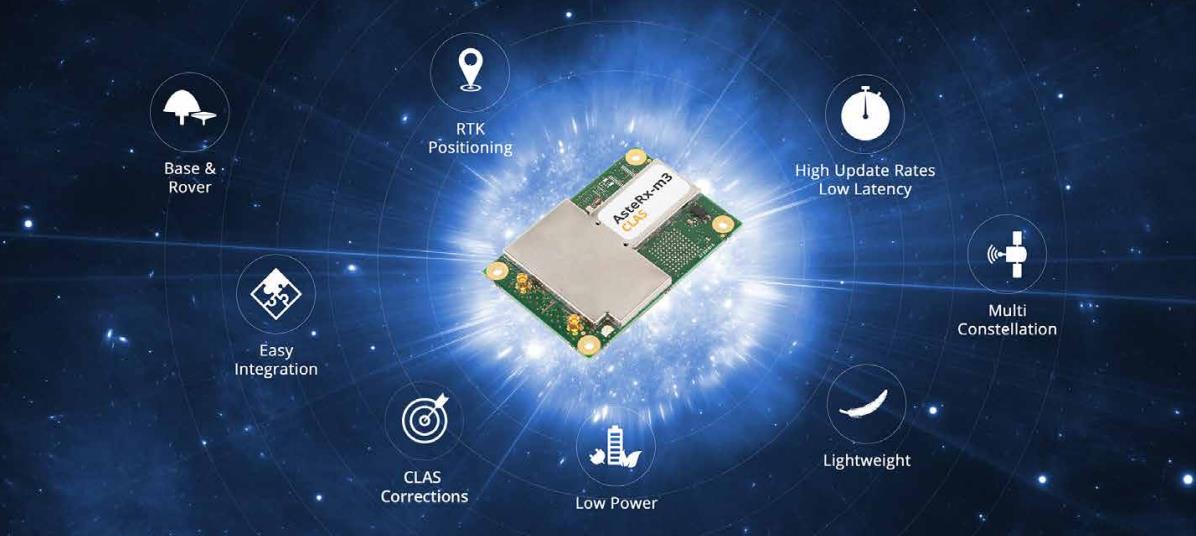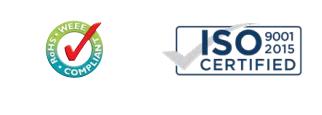Email: Tel:

Home Download GNSS Receivers GNSS OEM Boards AsteRx-m3 CLAS…

AsteRx-m3 CLAS is Septentrio’s best-in-class versatile OEM board. It is a multi-frequency GNSS receiver featuring top positioning performance with flexibility to be used either as a base station or as a rover receiver. In dual antenna mode10 it provides heading & pitch or heading & roll information on top of reliable and accurate positioning. It offers the convenience of plug-and-play sub-decimeter accuracy, thanks to the integrated PPP-RTK correction service from Centimeter Level Augmentation Service (CLAS) of Japan’s Quasi-Zenith Satellite System (QZSS).
KEY FEATURES
*Flexibility of use and easy-to-integrate
*Best-in-class SWaP (Size, Weight and Power)
*Full-constellation, triple-frequency satellite tracking
*Sub-degree GNSS heading & pitch or heading & roll10
*OSNMA Support
*High update rate with low latency
*Japan Centimeter Level Augmentation Service (CLAS) integrated
Easy-to-integrate
The AsteRx-m3 CLAS comes with fully documented interfaces, commands and data messages. The included RxTools software allows receiver configuration and monitoring as well as data logging and analysis. An SDK is provided, which allows integrators to create professional custom post-processing applications.
BENEFITS
Top performance in challenging environments
The AsteRx-m3 CLAS is designed to deliver reliable and robust positions even in challenging environments. The GNSS+ toolset is the technology that allows AsteRx-m3 CLAS to be reliable also in challenging environments where the GNSS signal is disturbed or the receiver is subject to shocks and vibrations:
*AIM+ most advanced on-board anti-jamming and anti-spoofing technology in the market
*LOCK+ for robust tracking during high vibrations and shocks
*APME+ to disentangle direct signal and those reflected from nearby structures
*IONO+ provides advanced protection against ionospheric disturbance
State of the art with flexibility of use
The AsteRx-m3 CLAS is a state-of-the-art GNSS receiver using triple frequency and multi-constellation GNSS technology both for maximal positioning availability and reliability in challenging conditions. It can be used as a base station or a rover receiver in single or dial antenna configuration. In dual antenna mode10 GNSS heading provides unmatched performance in both static and dynamic conditions removing the reliance on vehicle dynamics or magnetic sensors.
Such a versatile receiver allows integrators to keep a single item in stock which can be used in a multitude of applications.
Ultra-low power design
The AsteRx-m3 CLAS provides RTK positioning at the lowest power consumption of any comparable device on the market. This means longer operation on a single battery charge, smaller batteries and greater usability.
FEATURES
GNSS signals
544 Hardware channels for simultaneous tracking of most visible signals:
*GPS: L1 C/A, L2C, L2 P(Y), L5
*GLONASS: L1 C/A, L2C/A, L3, L2P
*BeiDou: B1I, B1C, B2a, B2I, B3I
*Galileo: E1, E5a, E5b
*QZSS: L1 C/A, L1C, L2C, L5, L6
*NavIC: L5
*SBAS: EGNOS, WAAS, GAGAN, MSAS, SDCM
Septentrio’s patented GNSS+ technologies
*AIM+ unique anti-jamming and monitoring system against narrow and wideband interference with spectrum analyser
* IONO+ advanced scintillation mitigation
*APME+ a posteriori multipath estimator for code and phase multipath mitigation
*LOCK+ superior tracking robustness under heavy mechanical shocks or vibrations
*RAIM+ (Receiver Autonomous Integrity Monitoring)
OSNMA Support
Formats
Septentrio Binary Format (SBF), fully documented with sample parsing tools
NMEA 0183, v3.01, v4.0
RTCM v2.x, v3.x (MSM messages included)
CMR v2.0 and CMR+ (CMR+ input only)
Connectivity
4 Hi-speed serial ports (LVTTL)
1 USB device port (TCP/IP communication and with 2 extra serial ports)
xPPS output (max 100Hz)
Ethernet port (TCP/IP, UDP, LAN 10/100 Mbps)
2 Event markers
Outputs to drive external LEDs
General purpose output
NTRIP (server, client, caster)
FTP server, FTP push, SFTP
SUPPORTING COMPONENTS
Web UI with full control and monitoring functionality.
RxTools, a complete and intuitive GUI tool set for receiver control, monitoring, data analysis and conversion.
GNSS receiver communication SDK. Available for both Windows and Linux.
PERFORMANCE RTK performance1,2,3 Horizontal accuracy 0.6 cm + 0.5 ppm Vertical accuracy 1 cm + 1 ppm Initialisation 7 s GNSS attitude accuracy 1,2,10 Antenna separation Heading Pitch/Roll 1 m 0.15° 0.25° 5 m 0.03° 0.05° Position accuracy1,2 Horizontal Vertical Standalone 1.2 m 1.9 m SBAS 0.6 m 0.8 m DGNSS 0.4 m 0.7 m Velocity accuracy1,2 0.03m/s Maximum update rate Position 100 Hz Measurements 100 Hz Latency4 <10 ms Time precision xPPS out5 5 ns Event accuracy < 20 ns Time to first fix Cold start6 < 45 s Warm start7 < 20 s Re-acquisition avg. 1 s Tracking performance (C/N0 threshold) Tracking 20 dB-Hz Acquisition 33 dB-Hz OPTIONAL ACCESSORIES *Antennas *GeoTagZ re-processing software and SDK library for UAS applications *Robotics interface board
PHYSICAL AND ENVIRONMENTAL Size 47.5 x 70 x 9.32 mm 1.87 x 2.75 x 0.36 in Weight 27 g / 0.952 oz Input voltage 3.3 VDC ± 5% Power consumption GPS L1/L2 750 mW GPS/GLO L1/L2 800 mW All signals, all GNSS 1000 mW constellations Antenna Connectors8 2 x MMCX Antenna supply voltage 3-5.5 VDC Maximum antenna current 150 mA Antenna gain range 15-45 dB I/O connectors9 30 Pins Hirose DF40 socket 60 Pins Hirose DF40 socket for expanded connectivity Environment Operating temperature -40° C to +85°C -40° F to +185° F Storage temperature -55° C to +85° C -67° F to +185° F Humidity 5% to 95% (non-condensing) Vibration MIL-STD-810G Certification RoHS, WEEE, ISO 9001-2015 |

1 Open sky conditions
2 RMS level
3 Baseline < 40 Km
4 99.9%
5 Including software compensation of sawtooth effect
6 No information available (no almanac, no approximate
position)
7 Ephemeris and approximate position known
8 Second connector for heading configuration
9 Backwards compatible with AsteRx-m for easy
replacement
10 Optional feature